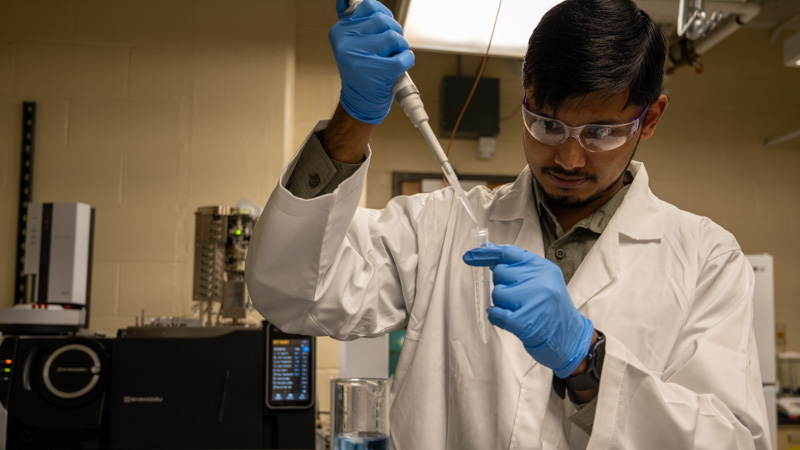July 09, 2025
PhD student Dibya Kanti Datta seeks to raise public awareness about emerging threats like microplastics and highlight the importance of environmental stewardship.

Graduate students come to Mizzou to make a difference through meaningful research. For environmental engineering student Dibya Kanti Datta, the drive to minimize pollutant exposure in drinking water and the environment has inspired a career in environmental research and community outreach.
“Observing the direct negative impacts of numerous types of pollution on everyday lives of people motivated me to pursue environmental research,” Datta said. “I believe that making a meaningful difference requires a deep understanding of the scientific and engineering principles behind these challenges.”
Under the guidance of Maryam Salehi, Datta investigates the fate and transport of both legacy and emerging contaminants in environmental and engineered systems. His research specifically focuses on lead and microplastic contamination.
While using lead in paint and gasoline has been phased out, lead plumbing systems persist in many places throughout the United States. Plastic pipes are commonly installed throughout the country due to their flexibility and low cost, but sometimes they get connected to legacy lead service lines. Lead can move through these hybrid connections, eventually ending up in the human body.
Datta is working to discover the factors influencing the mobility of lead in plumbing and how we can prevent it from contaminating our drinking water.
“By understanding contaminant behavior in water systems, I hope to inform policies and practices that ensure safe drinking water and minimize pollutant exposure,” he said. “The findings from my other research can also help raise public awareness about emerging threats like microplastics and highlight the importance of environmental stewardship.”
In the lab with Salehi, Datta is also exploring the redistribution of contaminants, such as microplastics, in coastal environments following hurricanes. Their goal is to provide insights into how extreme weather impacts pollutant behavior.
Datta says that Salehi’s work aligned perfectly with his aspirations and was one of his main reasons for coming to Mizzou. He also credits Mizzou’s robust academic curriculum and advanced research facilities as motivations to continue his education here.
Over the last three years, Datta has received numerous awards and research scholarships for his work.
“Graduate research can be demanding,” Datta said. “Receiving recognition validates the importance of the work I’m doing and motivates me to continue.”
Making real-world connections
Outside the lab, Datta is passionate about making sure communities are aware of the environmental issues caused by legacy and emerging contaminants.
Datta and Salehi have partnered with the Missouri Agricultural Experiment Station (MOAES) to raise awareness on agricultural plastic pollution. They were recently invited on as podcast guests to speak about their work.
“We got to connect with the farmers, discuss their agricultural practices and test samples from their fields to understand the real-world impact of plastic usage,” Datta said.
Datta will continue his work this summer in Salehi’s lab. He also plans to continue engaging in outreach opportunities and presenting research at national conferences.
“I aim to develop innovative solutions to pressing environmental challenges, working in research or an academic institution where I can generate knowledge and mentor future environmental professionals,” Datta said. “I hope my experience inspires others to pursue impactful work in environmental engineering.”
Conduct leading-edge research and make a difference in peoples’ everyday lives. Choose Mizzou Engineering!